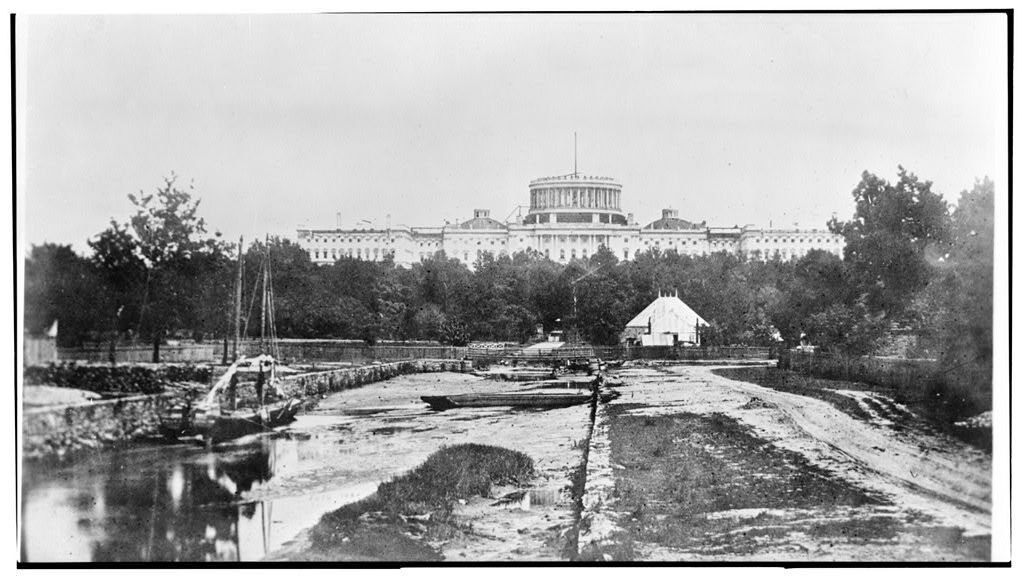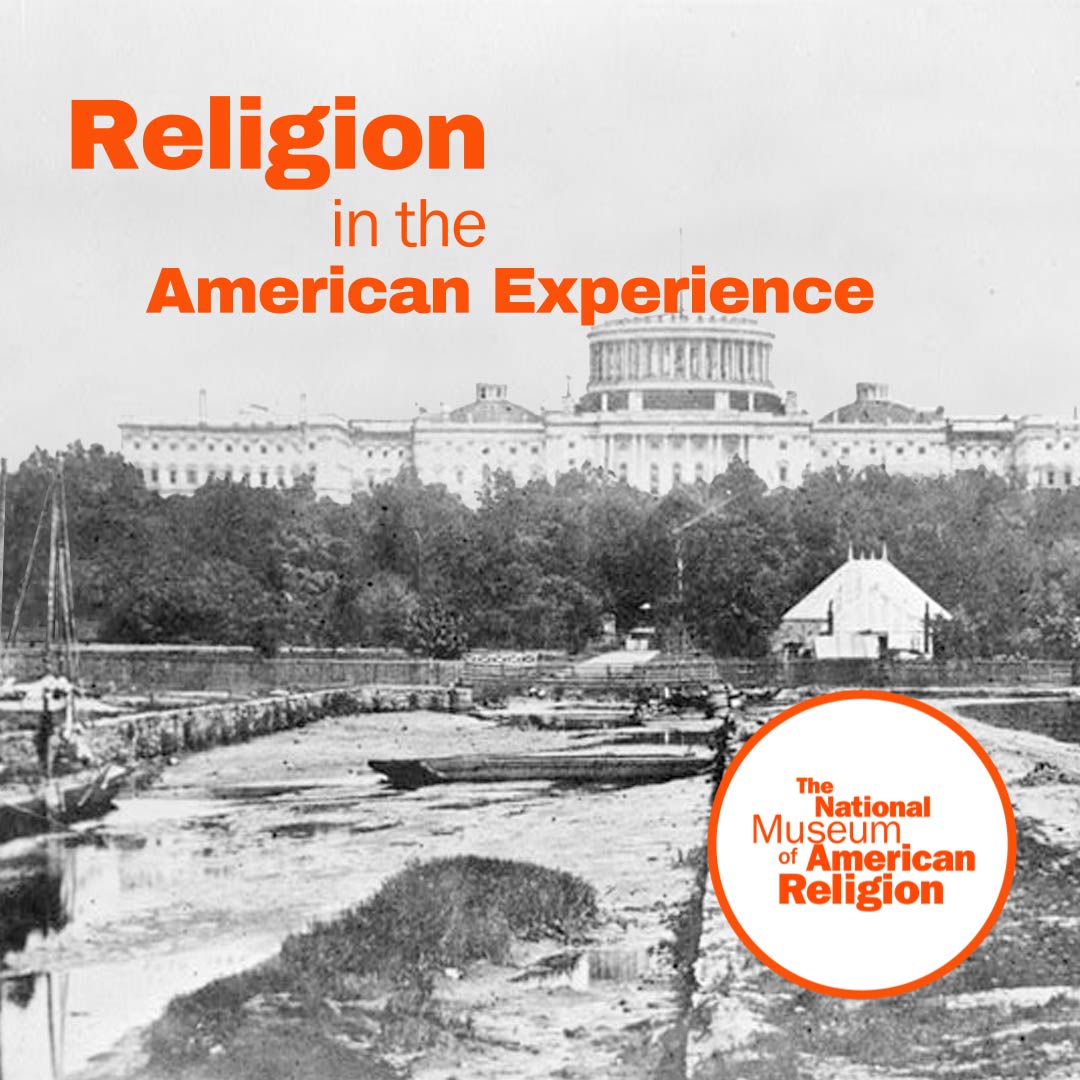
17.2K
Downloads
78
Episodes
Learning from scholars and every day Americans about what religion has done to America and what America has done to religion, helping all of us better comprehend and perpetuate the American experiment in self-government, including what is perhaps its greatest innovation and the essence of the American project: religious freedom as defined by the Constitution’s Article VI and First Amendment religion clauses.
Episodes
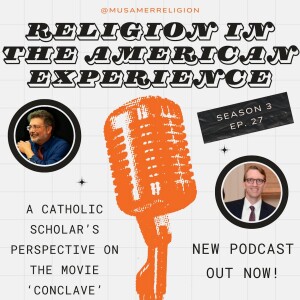
Monday May 05, 2025
The Movie "Conclave" and Choosing a New Pope
Monday May 05, 2025
Monday May 05, 2025
In two days, on Wednesday, May 7, the Catholic Church will begin the conclave to choose the next pope. This episode is about that process. There are more than 50 million Catholics in the United States.
The film “Conclave”, released in the fall of 2024, features the Catholic church’s process of electing a new pope, which process is called a conclave. In the fictional movie, the cardinal in charge of this conclave finds himself investigating secrets and scandals about several of the Cardinals who were possibly close to becoming the next pope.
The response from the Catholic community has been mixed. John Mulderig of the Catholic OSV News said that "rival viewpoints within the church are caricatured with a broad brush ... and the deck is predictably stacked in favor of those who advocate change". He warned that "all moviegoers committed to the church's creeds will want to approach this earnest, visually engaging but manipulative—and sometimes sensationalist—production with caution". On the other hand, the progressive National Catholic Reporter praised the film, calling it "a compelling and ecclesial call for a renewed spiritual stewardship characterized by humility, meekness, and, curiously, doubt".
In that spirit, we asked a church historian who has studied papal conclaves to share thoughts about the process of choosing a pope against the background of this movie.
We have invited Dr. Christopher Bellitto to discuss this with us. Dr. Bellitto is a medievalist, a church historian, and Professor of History at Kean University in Union, NJ, where he teaches courses in ancient and medieval history. He is a frequent public speaker and media commentator on church history and contemporary Catholicism. His book, Humility: the Secret History of a Lost Virtue, was published in 2023 and can be purchased here.
This is the second Religion in the American Experience episode responding to recent movies with a main focus on something religious. The other episode is an interview with a church historian of The Church of Jesus Christ of Latter-day Saints who addressed American Primeval.
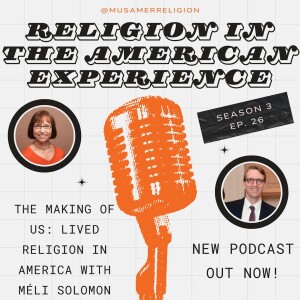
Thursday May 01, 2025
The Making of US: Lived Religion in America with Méli Solomon
Thursday May 01, 2025
Thursday May 01, 2025
The Making of US: Lived Religion in America is a subseries of the podcast Religion in the American Experience. In these episodes we explore the role religion has played in the lives of everyday Americans, reminding us that while religion exerts a significant influence on the events and movements of the American project, religions primary work and where it has the most influence, is in the everyday lives of adherents.
Today Méli Solomon of Boston, Massachusetts joins to tell us about her own religious history. You can see more about Méli and her work here: https://www.talkingwithgodproject.org/team
Religion in the American Experience is the podcast of The National Museum of American Religion (https://www.nmar.org). This private, digital-first museum explores what America has done to religion and what religion has done to America, which includes the establishment of religious freedom defined by the Constitution's Article VI and First Amendment religion clauses.
Advice for podcast episodes is provided by Dr. Lauren Turek (https://laurenturek.com/), Associate Professor of History at Trinity University in San Antonio, Texas. Technical audio and video assistance is provided by Dr. Randall Stephens (https://www.hf.uio.no/ilos/english/people/aca/randalls/), a Professor of American and British Studies at the University of Oslo.
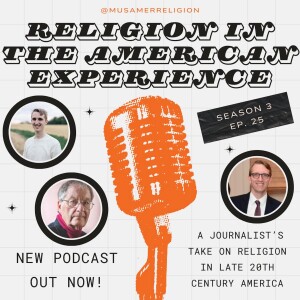
Friday Apr 11, 2025
A Journalist's View of 20th-century American Religion
Friday Apr 11, 2025
Friday Apr 11, 2025
We deeply appreciate Kenneth Woodward taking time to speak with us and share stories and perspectives on religion in the latter half of 20th-century America. This will help each of us better understand what religion has done to America and what America has done to religion, equipping us to more successfully buttress the fragile and meaningful American experiment is self-government.
Kenneth Woodward was hired as a journalist by the Omaha Sun newspaper in 1962. In 1964, he was named Religion Editor for Newsweek and remained in that position until 2002. He also served as the Ideas section editor from 1974 through 1978, and was named Senior Writer in 1988. After his retirement as Religion editor, he continued as a contributing writer to Newsweek, and as Regent's Lecturer at University of California, Santa Barbara.. He is the Writer-in-residence at the Lumen Christi Institute of the University of Chicago.
In his book Getting Religion, which was published in 2016, he shares unique views and perspectives from his journalistic perch of the American religious landscape in the latter-half of the 20th century.
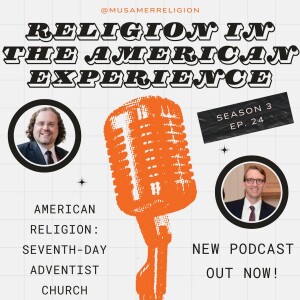
Friday Mar 07, 2025
American Religion: The Seventh-day Adventist Church
Friday Mar 07, 2025
Friday Mar 07, 2025
Religion in the American Experience is a podcast of the National Museum of American Religion, which is dedicated to telling the story of what religion has done to America and what America has done to religion.
Scholarly support provided by Dr. Lauren Turek, Associate Professor of History at Trinity University in San Antonio, Texas.
Technical audio and video assistance provided by Dr. Randall Stephens, a Professor of American and British Studies at the University of Oslo.
Season 3, Episode 24: American Religion: The Seventh-day Adventist Church
Guest Bio
Dr. David Trim is the Director of the Office of Archives, Statistics, and Research for the General Conference of the Seventh-day Adventist Church, based in Silver Spring, Maryland, USA. Born to missionary parents in Bombay, India, David was raised in Sydney, Australia, and educated in the United Kingdom. He has a BA from Newbold College and a PhD from King’s College London, University of London. For ten years he taught undergraduate courses in history and graduate courses in missiology at his alma mater, Newbold College, in England, and then for two years held the Walter C. Utt Chair of History at Pacific Union College in California. He is the author, co-author, editor or co-editor of 18 books, and has additionally published eighty scholarly articles and book chapters. He is a Fellow of the Royal Historical Society and is an adjunct professor of church history at the Seventh-day Adventist Theological Seminary.
Background
The Seventh-day Adventist Church is one of the few religions founded in the United States, coming into existence during the 19th century’s Second Great Awakening. Today it has approximately a million members-plus in the United States and upwards of 21 million members outside the U.S. The Seventh-day Adventist Church is one of the fastest growing Christian denominations in the world. On today’s episode we will explore the history of this home-grown American church, what its beliefs are, what roles it has played in the unfolding of the American project, and what roles it plays today on America’s dynamic religious landscape.
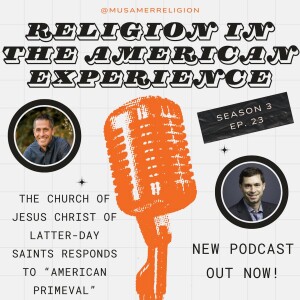
Friday Feb 21, 2025
Friday Feb 21, 2025
Religion in the American Experience is a podcast of the National Museum of American Religion, which is dedicated to telling the story of what religion has done to America and what America has done to religion.
Scholarly support provided by Dr. Lauren Turek, Associate Professor of History at Trinity University in San Antonio, Texas.
Technical audio and video assistance provided by Dr. Randall Stephens, a Professor of American and British Studies at the University of Oslo.
Season 3, Episode 23: The Church of Jesus Christ of Latter-day Saints Responds to “American Primeval.”
Guest Bio
Dr. Matthew C. Godfrey is a general editor of the Joseph Smith Papers and a senior historian in the Church History Department, The Church of Jesus Christ of Latter-day Saints. He holds a PhD in American and public history from Washington State University. Matt has authored or coedited several books, including five volumes in the Joseph Smith Papers, The Earth Will Appear as the Garden of Eden: Essays on Mormon Environmental History, and Religion, Politics, and Sugar: The Mormon Church, the Federal Government, and the Utah-Idaho Sugar Company, 1907-1921. Instagram handle: @matacious.
Background
On January 9th, 2025, Netflix released “American Primeval”, a series that uses the Mountain Meadows Massacre in southern Utah as a lens to explore frictions between Latter-day Saints and other cultures in the Utah Territory during the latter half of the 19th century.
The Church of Jesus Christ of Latter-day Saints released a statement addressing the series, which reads in part:
"A recently released streaming series presents a fictionalized interpretation of events in mid-19th century Utah. While historical fiction can be illuminating, this drama is dangerously misleading.
Brigham Young, a revered prophet and courageous pioneer, is, by any historical standard, egregiously mischaracterized as a villainous, violent fanatic. Other individuals and groups are also depicted in ways that reinforce stereotypes that are both inaccurate and harmful. As to the Mountain Meadows Massacre, which the series inaccurately portrays as reflective of a whole faith group, the Church has long acknowledged and condemned this horrific tragedy. It has also taken significant steps to uncover and share the full truth of what happened and promote healing. The problem with such deceptive, graphic and sensationalized storytelling is that it not only obscures reality and hinders genuine understanding but can foster animosity, hate and even violence."
The National Museum of American Religion felt it important to provide an opportunity for the main subject in the series, The Church of Jesus Christ of Latter-day Saints, to share its understanding of the historical record around Brigham Young, the Mountain Meadows Massacre, and the church’s efforts to establish itself in the 19th-century Great Basin.
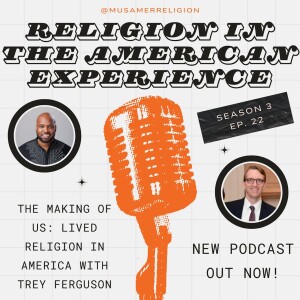
Monday Jan 20, 2025
The Making of US: Lived Religion in America with Trey Ferguson
Monday Jan 20, 2025
Monday Jan 20, 2025
Welcome to another episode of “The Making of US: Lived Religion in America”, a subseries of the podcast “Religion in the American Experience.” In this subseries we explore the role religion has played in the lives of everyday Americans, reminding us that while religion exerts a significant influence on the events and movements of the American project, religions primary work and where it has the most influence, is in the everyday lives of adherents.
Today Trey Ferguson of Homestead, Florida and joins to tell us about his own religious history. You can see more about Trey here.
Religion in the American Experience is the podcast of The National Museum of American Religion. This private, digital-first museum explores what America has done to religion and what religion has done to America, which includes the establishment of religious freedom as a governing principle, defined by the Constitution's Article VI and First Amendment religion clauses.
Advice advice for podcast episodes is provided by Dr. Lauren Turek, Associate Professor of History at Trinity University in San Antonio, Texas. Technical audio and video assistance is provided by Dr. Randall Stephens, a Professor of American and British Studies at the University of Oslo.
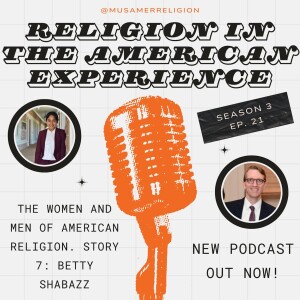
Wednesday Jan 15, 2025
The Women and Men of American Religion. Story 7: Dr. Betty Shabazz
Wednesday Jan 15, 2025
Wednesday Jan 15, 2025
Dr. Ali is an assistant professor of religion and politics at the John C. Danforth Center on Religion and Politics at Washington University at St. Louis. Dr. Ali’s research interests include Islam and gender, race and religion, and Muslims in popular culture. Her first book, The Women’s Mosque of America: Authority & Community in US Islam was published in 2022 with NYU Press, and analyzes how American Muslim women negotiate the Islamic tradition to cultivate religious authority and build gender-equitable worship communities. She received her PhD in religious studies from Boston University in 2019.
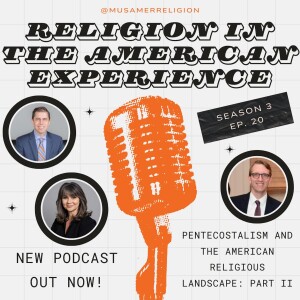
Tuesday Dec 31, 2024
Pentecostalism and the American Religious Landscape: Part II
Tuesday Dec 31, 2024
Tuesday Dec 31, 2024
As part of our multi-episode series about Pentecostalism – a relatively unknown and perhaps misunderstood, fast growing, and very large part of Christianity, we will be talking with Darrin Rodgers and Ruthie Oberg from the Flower Pentecostal Heritage Center in Springfield, Missouri.
The Flower Pentecostal Heritage Center (FPHC) is the largest Pentecostal archives in the world. Located in the National Office of the Assemblies of God USA, the FPHC collects printed materials, oral histories, artifacts, photographs, and memorabilia documenting the Assemblies of God and the broader Pentecostal and charismatic movements, spanning the globe. The FPHC has become an important hub for Pentecostal history and research, preserving and promoting Pentecostal testimonies and identity so that future generations can know the works of God. Countless church leaders, scholars, students, people in the pew, and other researchers have used its collections.
Darrin Rodgers is the director of the Center and has an M.A. in Theological Studies from Assemblies of God Theological Seminary and a J.D. from the University of North Dakota School of Law. He came to the FPHC from Fuller Theological Seminary, where he served at the David du Plessis Archive and the McAlister Library. He has authored Northern Harvest, a history of Pentecostalism in North Dakota, and numerous articles in books and journals. His research interests include Pentecostal origins, ethnic aspects of Pentecostalism's development, and the intersection of Christianity and culture.
Ruthie Oberg is an events speaker with the Center and is an ordained Assemblies of God minister, having served in senior and associate pastoral roles for 25 years. Ruthie speaks at national conferences, local churches, has produced a daily radio program in the Omaha market. Her articles have appeared in the Pentecostal Evangel, Enrichment, Influence, and Assemblies of God Heritage, and she is a regular contributor to “This week in AG History” for AG News. She is also a past chair of the Library and Research Committee of the Society for Pentecostal Studies.
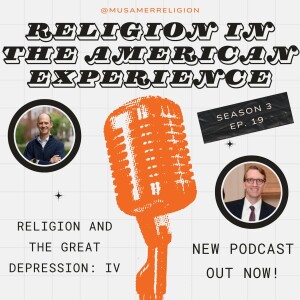
Wednesday Dec 18, 2024
Religion and the Great Depression: Part IV
Wednesday Dec 18, 2024
Wednesday Dec 18, 2024
Lodged firmly in the American psyche and a bedrock part of American and personal family histories, is the Great Depression. Beginning with the stock market crash in October of 1929 - the market losing 50% of its value in weeks - and lasting more than a decade, it was the worst calamity to hit the United States since the Civil War. At its worst one out of every four workers was unemployed. Farms went under with their former inhabitants leaving their homes seeking shelter, food, and work; poverty and want were everywhere. The emotional toll on millions was severe. Americans and America was traumatized and transformed.
For us the question is, in what ways did religion – one of the greatest and most ubiquitous forces in American history – react to the Great Depression? Understanding this will help us comprehend religion’s role in the American project, equipping us to be perpetuate and perfect it into the 21st century.
As part of our multi-episode series about religion in the Great Depression, Dr. Jonathan Ebel will share the story of New Deal government camps for migrant workers in California and what he calls “the religion of reform.”
Dr. Jonathan Ebel is a professor of religion at the University of Illinois Urbana-Champaign. He received his PhD from the University of Chicago and has B.S. from Harvard. Professor Ebel's research program involves religion and war, religion and violence, and lay theologies of economic hardship all within the American context. He is the author of several books including From Dust They Came: Government Camps and the Religion of Reform in New Deal California, G.I. Messiahs: Soldiering, War, and American Civil Religion, Faith in the Fight: Religion and the American Soldier in the Great War, and is the co-editor of From Jeremiad to Jihad: Religion, Violence, and America. He is currently at work on a religious history of American warfare in five weapons.
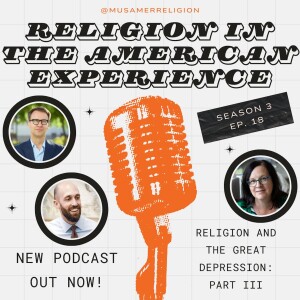
Tuesday Dec 10, 2024
Religion and the Great Depression: Part III
Tuesday Dec 10, 2024
Tuesday Dec 10, 2024
Lodged firmly in the American psyche and a bedrock part of American and personal family histories, is the Great Depression. Beginning with the stock market crash in October of 1929 - the market losing 50% of its value in weeks - and lasting more than a decade, it was the worst calamity to hit the United States since the Civil War. At its worst one out of every four workers was unemployed. Farms went under with their former inhabitants leaving their homes seeking shelter, food, and work; poverty and want were everywhere. The emotional toll on millions was severe. Americans and America was traumatized and transformed.
For us the question is, in what ways did religion – one of the greatest and most ubiquitous forces in American history – react to the Great Depression? Understanding this will help us comprehend religion’s role in the American project, equipping us to be perpetuate and perfect it more successfully into the 21st century.
As part of our multi-episode series about religion in the Great Depression, Dr. Lisa Tait, Dr. Ben Park, and Dr. Matt Bowman are here to tell the story of how The Church of Jesus Christ of Latter-day Saints responded to and was changed by the Great Depression.
Dr. Lisa Olsen Tait works in the Church History Department of The Church of Jesus Christ of Latter-day Saints and is a historian and writer specializing in women’s history. Dr. Tait received a PhD in American Literature and Women’s Studies at the University of Houston. Her dissertation and several subsequent publications are on Latter-day Saint women’s response to the gendered and generational crises of the 1890s. Dr. Tait’s long-term project is a biography of Susa Young Gates, one of Brigham Young’s daughters.
Dr. Benjamin Park is an associate professor of history at Same Houston State University where he studies the intersections between religion, culture, and politics in America, mostly during the eighteenth and nineteenth centuries and often within a broader Atlantic context. He received a PhD in history from the University of Cambridge. He has written several books including American Nationalisms: Conceiving Union in the Age of Revolutions, 1783-1833, Kingdom of Nauvoo: The Rise and Fall of a Religious Empire on the American Frontier, and American Zion: A New History of Mormonism. Dr. Park currently serves as an associate editor of Mormon Studies Review.
Dr. Matthew Bowman is the Howard W. Hunter Chair of Mormon Studies, with a joint appointment in history and religion, at Claremont Graduate University. He received a PhD in American History from Georgetown University. Dr. Bowman is a specialist in American religious history, with particular interests in Mormonism, new religious movements, and the development of the concept of “religion” in the United States. He is the author or co-editor of The Mormon People: The Making of an American Faith, Women and Mormonism: Historical and Contemporary Perspectives, and Christian: The Politics of a Word in America. Dr. Bowman is currently serving as co-editor of the University of Illinois Press series Introductions to Mormon Thought.
